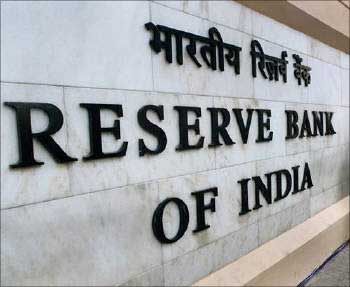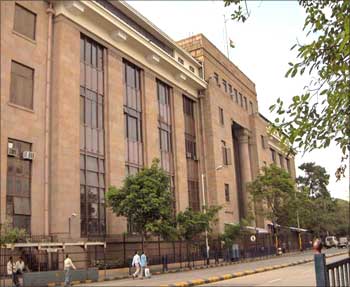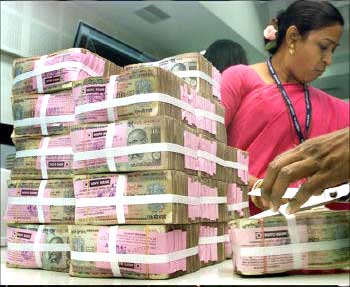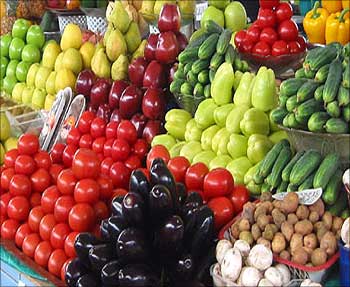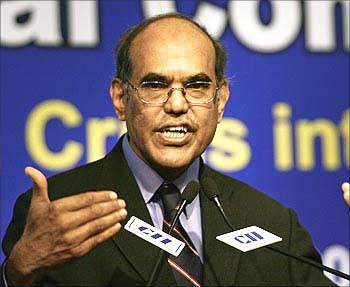 | « Back to article | Print this article |
Five segments to feel heat from RBI rate hike
The writing on the wall is clear - expect growth rates to become slower. With RBI raising the repo rate by 50 basis points (bps) to eight per cent and the allied reverse repo and margin standing facility rates to seven and nine per cent, respectively, banks will be pressed to pass on this increase in cost.
This will lead to a rise in the cost of borrowing for corporate India and individuals in the coming days. One percentage point is 100 basis points.
The rise in policy rates is expected to further dampen growth in demand for goods and services, especially in rate-sensitive sectors such as realty, automobiles, capital goods, infrastructure and banking.
Click NEXT to read more...
Five segments to feel heat from RBI rate hike
Most rate-sensitive sector indices dipped by two to 3.6 per cent and stocks by as much as five per cent.
Rupa Rege Nitsure, chief economist, Bank of Baroda, says this move is a clear indicator that RBI prefers a slight moderation in GDP growth to around 7.5 to eight per cent, with inflation at an equable seven per cent, against a more heated pace of GDP growth at 8.5 per cent pulling inflation to 10 per cent levels.
The cost of capital has to increase, given the existing supply-side stress and infrastructure deficit, she points out, adding that most growth indicators are still strong.
Click NEXT to read more...
Five segments to feel heat from RBI rate hike
Auto analysts have started pruning their volume estimates following the interest rate rises and feel the growth is likely to be in single digits for the current financial year.
Vineet Hetamasaria, auto analyst at Pioneer Intermediaries, says passenger vehicle volume growth estimates are likely to fall from 12 per cent for 2011-12 to eight to 10 per cent.
The Society of Indian Automobile Manufacturers, which had lowered the volume growth number for the current financial year by 200 bps to 12-13 per cent, could revise this number downwards.
Click NEXT to read more...
Five segments to feel heat from RBI rate hike
Analysts believe a five per cent fall in volumes is likely to impact earnings to the tune of seven to eight per cent.
They say the real impact on volumes will show from the month of August, which also marks the start of the festival season, wherein consumption usually surges.
On the realty segment, Monga says: "Although house prices mainly influence mortgage demand, which interest rates tend to compensate for, the prevailing rates will add to the impact."
Nitsure adds all construction-related sectors to the list, including steel and cement alongside consumer durables.
Click NEXT to read more...
Five segments to feel heat from RBI rate hike
Investment-led sectors, which have been slow for the past two to two and a half years, will continue to see modest order book pictures.
Likewise, companies in the construction space will also feel the heat.
"The revenues (of capital goods companies) might not get impacted because of their order book, but there could be pressure on order inflows, which is already a concern.
EPC (engineering, procurement, construction) players, which have large working capital needs, could see their earnings getting impacted," says Rabindra Nath Nayak, senior analyst at SBI Cap Securities.
Click NEXT to read more...
Five segments to feel heat from RBI rate hike
Analysts believe banks will most likely pass on the rate rises to customers but while this pass-through has been proportionate for the past six months, given the demand slowdown it may become lower.
Click NEXT to read more...
Five segments to feel heat from RBI rate hike
Sectors catering to rural and semi-urban demand, including fast moving consumer goods, tractors and some luxury products could resist this trend, says Monga.
But, urban-centric sectors, including malls and entertainment, may see demand slowing.
He believes demand sentiment has already moderated but adds the busy festival season will be the test and demand slowdown could lead to price corrections.
This was reiterated by Maruti's management in their post-results' analyst call.
Apart from a general slowdown, rural demand has also has been less buoyant than in the past. They hope it will pick up in the festival season.
More significantly, no one is willing to call a peaking of rates given the RBI's tone and Nitsure believes that this won't happen till inflation decreases consistently week on week.

